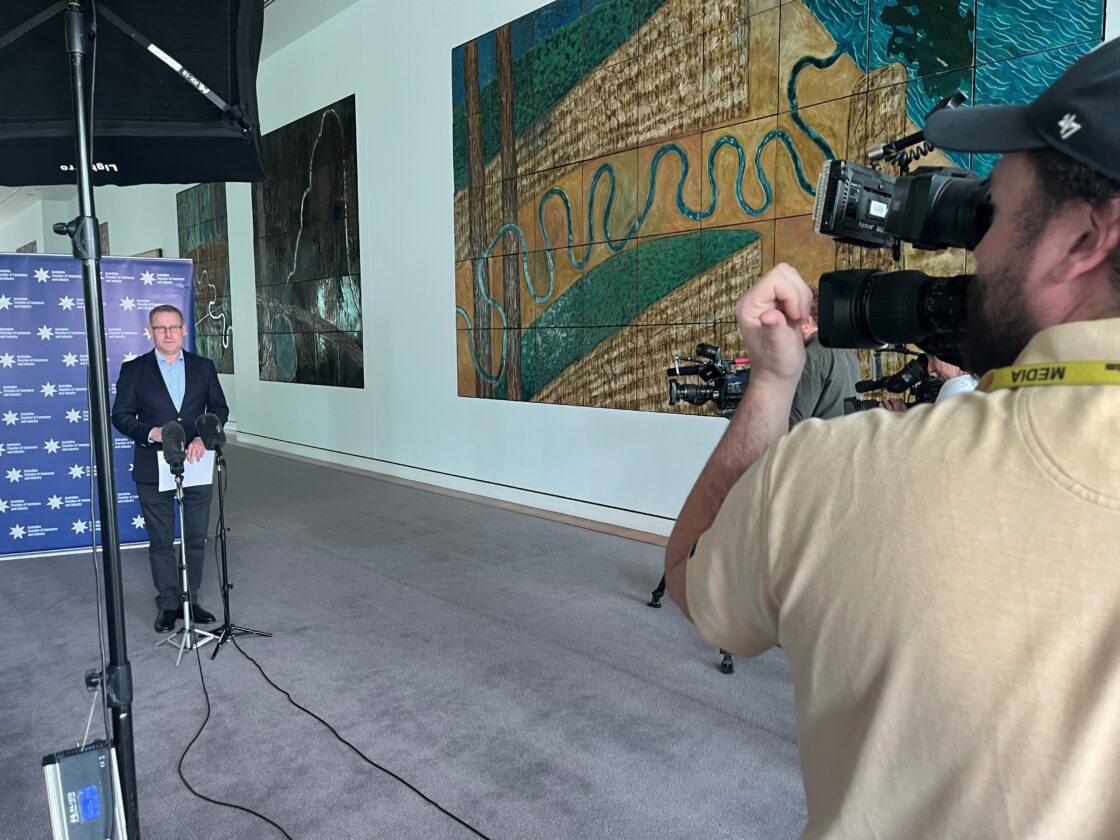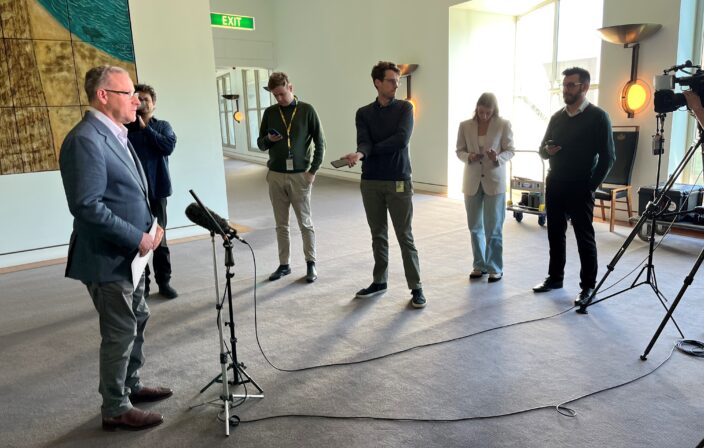Transcript: Doorstop interview at Parliament House Canberra
25 Aug 2024
|Media Release

Event: Andrew McKellar doorstop at Parliament House Canberra
Date: Sunday 25 August 2024
Topics: Changes to the workplace coming into effect on Monday August 26, collective bargaining and CFMEU
E&OE
Andrew McKellar:
Okay, thanks very much. Good morning
From tomorrow we will see around half a dozen measures being implemented from the Closing the Loopholes Bill, or as we call it the strangling small business bill. Those measures will include a new right to disconnect. They will include changes in the definition and the operation of casual employment arrangements.
They will include a new definition of employment impacting in some cases independent contractors, and it will also involve changes through employment arrangements in the gig economy and also for the road transport sector. All in all, these are significant increases in the level of complexity for business, the level of red tape that many businesses will have to grapple with. I think there’s also a significant risk that this could mean increases in input costs for some businesses, and of course in some cases that’s going to mean that those costs will be passed on to consumers. So I think it’s a concerning day. Business is alarmed about the impact this will have in the future for the level of red tape and compliance. It will make it harder for many businesses to make the decision to create jobs and employ more people. So happy to take some questions
Journalist:
In terms of what you’re hearing from your members in implementing the right to disconnect aspect. Has there been consultation and are people clear exactly what they need to do and the rules around it?
Andrew McKellar:
Well, no, they’re not. I mean, obviously we are out there talking to business, so we’re informing them about these new obligations. We’re only just seeing now a new provision that will go into awards, so from tomorrow all awards will be changed so that they have that provision included in them. The legislation will come into effect, but I think there’s a real level of uncertainty about what it means for employers and what it means for employees. So it doesn’t mean that they have the right not to respond. No, it’s not a blanket right of course, it has to be reasonable. It has to be on reasonable grounds, and I think at the moment there’s a real lack of certainty about what determines whether that action is reasonable or unreasonable, and I think that’s something that we really won’t know how that is going to be interpreted until we start to see some test cases coming forward in the commission in the courts, and really I think that’s not an ideal environment. The other thing is, of course for small business, this will not apply to small business from tomorrow or those businesses with 15 employees or less. There’s a further 12 months, but the clock is ticking. And I think if you look in other jurisdictions around the world, in France, for example, where a right to disconnect was applied that had a threshold of 50 employees. So here in Australia it’s much more sweeping. It’s going to impact businesses right across the board, and we’re most worried about the impact that will have for small business.
Journalist:
When you say impact, and even when it comes to doubt, what is the impact? What will the practical effect of these rules be for businesses and for employees?
Andrew McKellar:
Well, I think it will mean that there’s obviously less flexibility. I think what we’re going to see is that this will become an issue. It’s another ground that can be used when you get into a situation where there’s a breakdown in the employment relationship, and that’s where we expect that we will see the main impact is that this becomes another basis for litigation. So the lawyers will be the winners, small business will be the losers. The concern is it makes it much harder for businesses right across the board to make that decision to commit to take on more employees, and it cuts against the grain. When coming out of the pandemic we’ve seen many people saying they want more flexible work arrangements. They want to be able to work from home some of the time or have the choice to work remotely. That cuts against the grain of those sorts of arrangements where the boundaries become less clear and we’re going to have that uncertainty.
Journalist:
Do you think it’ll make the productivity problem even worse if people can’t get people working when they need to be?
Andrew McKellar:
The net effect of these changes is to crush productivity. It’s going to make it much harder for businesses who want to get that flexibility, and we’re already seeing other claims coming forward from the union movement about what’s the impact of things like artificial intelligence, how’s that going to impact workplaces? That should make it easier for people to do their jobs. It should make their productivity more possible. So I think if you put that together with these changes, then I think the risk is that we are seeing more and more challenges to getting the productivity that we need in the Australian economy, and that’s a bad thing because that’s going to hold back on wages growth in the future.
Journalist:
Just separate issue on IR on Friday the Fair Work Commission handed down a ruling to compel three New South Wales based mining companies to enter into collective bargaining. It obviously relates to the first tranche of IR laws that were passed under this government. So I guess we’re now seeing the effect of these laws starting to flow through. Do you think there’s a possibility that as that happens, the government will perhaps realise or belatedly that they’ve perhaps stepped too far, that there has been overreach, and what are the consequences as we start seeing these laws flow through?
Andrew McKellar:
Well, that’s something we are very concerned about. So this idea of multi-employer bargaining potentially where you have work sites where there may not be a majority of union employees or there may not be a wish to enter into some of those multi-employer agreements. I think that’s also going to be a risk. And again, it moves away from what drives productivity. You get that productivity when you are able to set conditions and arrangements at the workplace level, at the enterprise level rather than trying to fit a one size fits all solution. I mean, the other thing to say here, and I come back to the point on the compliance burden, red tape, what we’ve seen, we’ve been out talking to small business in recent months and we have seen that about 82 per cent of all small businesses are concerned about the impact of regulation, red tape on compliance on their businesses. 61 per cent of them have seen that burden go up in the past 12 months, and nearly half, 45 per cent, of all small businesses have said that in the past 12 months they were considering closing their doors. That’s not a situation that we want to see. Red tape regulation compliance is the biggest issue that small businesses grappling with at the moment along with rising costs. If you are going to add to that burden, then it just gets so much harder for small business.
Journalist:
Have you been able to sit down with Murray Watt since he’s taken over the portfolio and that’s your relationship with him like?
Andrew McKellar:
We have. We’ve had a couple of opportunities to engage with Murray Watt as the new minister. I have to say, those have been very constructive engagements. Obviously, one of the key topics that we’ve been talking about is the issue of the CFMEU and how the government is responding to that. We support the legislation that the government has passed to put in place an administrator, and I think it’s good that they’ve acted swiftly to implement those arrangements from Friday. That’s a good first step. It’s a necessary step, but it’s not a sufficient step. The other area where we have a big concern now is the resources and the powers that the existing regulators have. So whether that’s the Fair Work Commission or the Fair Work Ombudsman, and we’ve been talking to them as well. Our concern is they don’t have the resources. They don’t the powers that give many businesses the confidence to come forward and provide evidence about the wrongdoing, including criminal conduct that’s been occurring in that sector. So they need to have those strengthened powers if they’re going to be fully effective. It’s one thing to have an administrator going in, but we have to take many other steps and to shed light on the sorts of conduct that’s been going on to bring forward the evidence to be able to launch the prosecutions and to be able to ensure that people pay a real penalty for criminal conduct, let alone the other things that have been happening in that sector.
Journalist:
What do you make of some of the calls from the CFMEU members ship to strike and the threat that they’re putting out there?
Andrew McKellar:
Oh, look, we know they’re not going to be happy. We know that they’re not going to lie down and go away. There’s an ingrained culture. That culture has to be broken. It has to be turned around, and it can only happen if there’s a number of different measures, approaches being put in place. Administration is one of those. I think obviously ensuring that you have a strong, well-resourced, regulated with all the powers that it needs to really clamp down on activities of coercion, the standover tactics, the closed shop arrangements, as well as obviously the criminal conduct that’s been going on. If you don’t have those things, then you won’t be able to get results. Clearly, there will be an ongoing battle in this space, but this is the best opportunity in decades to put an end to the corrupt culture that has been rampant across the construction industry in Australia.
Journalist:
Just finally on the changes with the IR laws for rideshare workers, could we see our Uber Eats costs going up?
Andrew McKellar:
They’ve signaled that that’s a real possibility. I think the other thing here that we are concerned about is it’s one thing with the federal standards that have been brought in, but we’re also seeing the New South Wales government seeking to come around the side introducing its own standards and arrangements, and I think there’s a real risk that that’s going to involve extra layers of duplication to jurisdictions tripping over each other. So if we start seeing the states trying to also move into that space, then really, I think that’s going to be incredibly inefficient and something that should be absolutely avoided. Thank you. Thank you very much.


